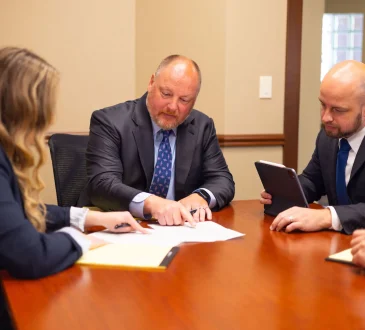
Becoming a U.S. citizen is more than paperwork; it’s a structured legal process that rewards careful planning and attention to detail. If you understand each step—who qualifies, what documents matter, how interviews unfold—you can move forward with confidence. Experienced guidance helps transform confusing rules into clear decisions, and firms like Nanthaveth and Associates provide structure from eligibility screening to the oath ceremony. Working with an experienced Immigration Lawyer for Citizenship can also reduce avoidable delays by flagging issues before they become obstacles. This article walks you through the essentials and highlights how recent policy directions in 2025 may influence timing and strategy.
Key Eligibility Requirements Every Applicant Must Meet
U.S. citizenship through naturalization requires meeting several core criteria, and knowing them early helps you decide when to file. Most applicants must be at least 18, hold permanent resident status, and demonstrate continuous residence for five years—three years if married to a U.S. citizen and meeting all spousal-based requirements. Physical presence usually means spending at least half of that qualifying period inside the United States, and extended trips abroad can disrupt eligibility if not carefully explained. Applicants must also show good moral character during the statutory period, which involves tax compliance, honest disclosures, and resolving any past legal issues with documentation. English language and civics knowledge are required, with limited exceptions based on age and long-term residency, and medical waivers are available under strict standards.
Continuous Residence and Physical Presence Explained
Time outside the country can complicate a case, especially if any trip lasted six months or longer. Long trips may be rebuttable with strong evidence—such as proof of employment, a lease, and ongoing family ties—demonstrating that your primary residence remained in the U.S. When in doubt, plan a filing date that clearly satisfies both residence and physical presence to avoid later disputes. Males who lived in the U.S. between ages 18 and 26 should check Selective Service requirements, and everyone should ensure tax returns align with permanent resident status. Consulting an Immigration Lawyer for Citizenship early can prevent missteps with timing, travel, and disclosures, especially if your history includes complex travel or prior legal incidents.
Preparing Essential Documentation for a Strong Application
A successful N-400 package supports every factual statement with clear evidence, and accuracy matters as much as volume. Start with your permanent resident card, government photo identification, and updated address and employment history. Travel dates should be listed precisely, which may require reviewing passport stamps, flight records, or I-94 history to fill gaps. If you apply based on marriage to a U.S. citizen, assemble proof of a bona fide marriage—joint tax returns, leases, insurance, or child birth certificates. Applicants with prior arrests, citations, or court interactions should provide certified court dispositions and police records, along with a concise explanation of the events.
Document Checklist Essentials
Core items typically include your green card, passports (current and expired), state ID, and two recent photos for paper filings. Add marriage certificates, divorce decrees, and evidence of spouse’s U.S. citizenship for marriage-based cases, plus Selective Service proof where applicable and IRS tax transcripts when helpful. If any document is not in English, include a full, certified translation that matches the original exactly. If fees are a hardship, explore the fee waiver request with supporting financial evidence and remember that accurate filing includes correct fees for your filing category. An Immigration Lawyer for Citizenship can refine your checklist, make sure certified copies meet USCIS expectations, and keep your proof curated rather than cluttered—strong, relevant, and easy for an officer to review.
Interview Expectations and Tips for Success
Your interview is both a review of your application and a chance to confirm eligibility through English and civics testing. Before the appointment, you may have a biometrics visit, where USCIS collects fingerprints and a photo; sometimes biometrics are reused from prior visits. On interview day, arrive early with originals and copies of key documents, including any updates since filing, like new trips, address changes, or marital status changes. Be ready for detailed questions about your background, time abroad, taxes, and how you support yourself. Clear, concise answers tend to help; volunteering extra information can confuse the record, so let the officer guide the conversation.
What Happens at the Biometrics and Interview
The civics portion includes up to 10 questions from the official list, and you must answer at least 6 correctly to pass. You will also read and write one simple sentence in English, unless you qualify for an age- and residence-based exemption that allows the civics test in your native language with an interpreter. If you have a qualifying disability, a medical professional may complete the N-648 to request accommodations or an exemption according to USCIS standards. Prepare by studying official materials, practicing out loud, and reviewing your N-400 to ensure your answers are consistent with your filing. A seasoned Immigration Lawyer for Citizenship can conduct a mock interview, identify weak spots, and provide guidance on addressing sensitive topics without overexplaining.
How Legal Advisors Simplify Complex USCIS Procedures
Professional guidance can transform a complicated case into a structured, credible submission that anticipates questions before they are asked. Attorneys analyze your case strategy, including eligibility dates, long trips, criminal records, and prior immigration filings, and then propose a timeline that strengthens rather than weakens your position. They also help you decide whether to file online or by mail, which can matter for evidence formatting and ease of later updates. If USCIS issues a Request for Evidence (RFE) or a Notice of Intent to Deny (NOID), legal counsel can craft a targeted response supported by statutes, policy guidance, and persuasive documentation. After the interview, they can track outcomes, follow up on pending items, and escalate appropriately if a case becomes stuck.
From Mapping Strategy to Filing
A skilled legal team reviews your narrative to ensure it is consistent—from your travel dates to your employment history and tax filings—reducing inconsistencies that burn time later. They can request records through FOIA when documents are missing, coordinate medical and language-based exceptions correctly, and incorporate relevant policy updates. When needed, they help with N-336 appeals, reopening strategies, and proper documentation for name changes at the oath ceremony. The proactive approach offered by firms like Nanthaveth and Associates includes practical steps—evidence curation, interview coaching, and tight deadline control—so your file remains organized and compelling. In close cases, this structure often makes the difference between a smooth approval and a long delay.
Avoiding Delays Through Accurate Filing and Preparation
Delays often start with small errors—missing signatures, miscalculated travel days, outdated addresses, or unchecked boxes on the N-400. Consistency across your application, tax files, and identity documents signals reliability to an adjudicating officer. If you move while your case is pending, promptly file an address update to ensure you don’t miss notices, biometrics appointments, or interview letters. Bring all original civil documents to the interview, even if you previously submitted copies, and be prepared to provide updated information about new trips or family changes. If you anticipate an issue, it’s better to resolve it proactively than to wait for USCIS to flag it.
Practical Steps to Prevent Backlogs
Create a timeline of all trips over 24 hours outside the U.S., including dates and destinations, and double-check that list against your passport stamps. Keep a clean, labeled evidence packet for the interview, and if you file online, upload well-named PDFs that are easy to read. Track your case in your USCIS online account, respond to any RFE by the earliest possible date, and bring a complete copy of your filing to the interview for quick reference. If you must reschedule biometrics or an interview, follow the instructions precisely and document your request. These practical habits keep your case on schedule and prevent avoidable continuances that can add months to the process.
The Impact of 2025 Policy Changes on Citizenship Timelines
Naturalization timelines reflect both national policy priorities and local field office capacity, and 2025 continues a focus on backlog reduction and service modernization. USCIS has emphasized expanded digital filing, e-delivery of some notices, and workflow improvements designed to move straightforward cases faster. That said, timeline improvements are not uniform; some field offices process cases more quickly than others due to staffing, volume, and regional demand. Enhanced security vetting and surges in filing—often tied to public events—can extend processing in certain locations. The result is a dynamic landscape where planning must be based on the most current information rather than last year’s averages.
Reading Processing Times in Context
Use the USCIS Processing Times tool to view current estimates for your field office and to understand when a case can be considered outside normal time. Typical naturalization windows can range widely, so treat published numbers as estimates, not guarantees, and build in a cushion for travel and life events. If you encounter extended delays, review your case for unresolved issues—missing documents, mismatched information, or pending background checks—and consider polite service requests when your receipt date is clearly outside the posted timeframe. Expedited processing is rare and generally reserved for limited circumstances; it’s best to plan around standard timelines. Keeping expectations realistic while maintaining a complete, consistent file is the most reliable path to a timely oath ceremony.
Why Professional Support Strengthens Application Outcomes
While many applicants qualify on paper, successful outcomes hinge on credibility, clarity, and the strength of your evidence. Professionals refine your narrative, align each claim with documentation, and prepare you for tough interview questions without overcomplicating your answers. They also manage special issues—like long trips, past arrests, or tax discrepancies—so they’re addressed honestly and persuasively rather than overlooked. For those who qualify for accommodations or exemptions, a lawyer coordinates forms and medical support to meet USCIS standards without unnecessary delays. In close cases, the difference often lies in presentation: the right facts, in the right order, backed by the right documents.
Choosing the Right Support for Your Case
Look for deep naturalization experience, clear communication, and a structured approach to evidence and interview preparation. Ask how the firm handles RFEs, NOIDs, and N-336 appeals, and whether they conduct thorough mock interviews and document audits before you meet an officer. Consider the value of local field office familiarity and language support, especially if you qualify for an English exemption and will use an interpreter for the civics test. Nanthaveth and Associates offers a comprehensive approach that aligns eligibility, documentation, and interview advocacy, making complex cases more manageable. When you work with an experienced Immigration Lawyer for Citizenship, you gain a steady process, fewer surprises, and a stronger chance of reaching the oath with confidence.




